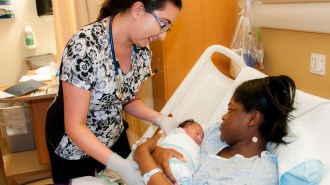U.S. dementia cases may rise to 1 million per year by 2060
Previous estimates of dementia risk may have been too low

Nearly half of people in the United States will develop dementia after age 55, a new study predicts.
adamkaz/E+/Getty Images Plus
Baby Boomers may drive a bigger-than-expected boom in dementia cases.
By 2060, 1 million U.S. adults per year will develop dementia, scientists predict January 13 in Nature Medicine. Dementia is a broad term encompassing many symptoms, including memory, reasoning and language difficulties that interfere with people’s daily lives. Researchers estimate that it currently affects more than 6 million people in the United States.
“This is a huge problem,” says Josef Coresh, an epidemiologist at New York University’s Grossman School of Medicine. A rise in the projected number of dementia cases is not surprising, given the aging U.S. population — but the extent of the rise stands out, he says.
His team predicts that 42 percent of people in the United States who are over 55 years old will develop dementia sometime during their lifetime. That’s about double the percentage estimated by previous researchers.
Coresh’s new estimate is based on a study population that’s larger — more than 15,000 people — and more diverse than earlier work. His team followed participants for years, in some cases decades, using several methods to identify dementia cases. They pored over hospital and death records, evaluated participants in person and screened them by phone. For the last decade, the researchers have been calling participants twice a year, Coresh says. That gave the team a window into people’s lives, revealing dementia cases that might otherwise have gone unreported.
Though the team focused on dementia in people over age 55, risk doesn’t typically start ticking up for decades. And some populations were at greater risk than others, including women, Black people and those with a particular gene variant linked to Alzheimer’s disease.
Dementia risk in U.S. adults over age 55
As people age, their risk of developing dementia steeply increases. After age 55, a person’s lifetime risk of dementia is about 42 percent.
But there’s reason for hope, Coresh says. A high risk isn’t a certainty — people’s brains aren’t fated to decline. And “a lot of dementia risk is modifiable,” he says.
Improving cardiovascular health and exercising can both help reduce an individual’s risk — as can preserving people’s hearing. In a 2023 study of older adults with hearing loss, people who received hearing aids experienced a lower rate of cognitive decline than those who didn’t.
Scientists have many ideas for why hearing aids may ward off dementia. It’s possible they preserve the brain’s structure. Hearing aids could also help people engage socially, which may boost brain health.







